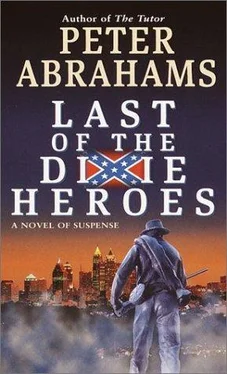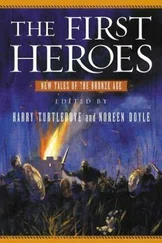Peter Abrahams - Last of the Dixie Heroes
Здесь есть возможность читать онлайн «Peter Abrahams - Last of the Dixie Heroes» весь текст электронной книги совершенно бесплатно (целиком полную версию без сокращений). В некоторых случаях можно слушать аудио, скачать через торрент в формате fb2 и присутствует краткое содержание. Жанр: Триллер, на английском языке. Описание произведения, (предисловие) а так же отзывы посетителей доступны на портале библиотеки ЛибКат.
- Название:Last of the Dixie Heroes
- Автор:
- Жанр:
- Год:неизвестен
- ISBN:нет данных
- Рейтинг книги:4 / 5. Голосов: 1
-
Избранное:Добавить в избранное
- Отзывы:
-
Ваша оценка:
- 80
- 1
- 2
- 3
- 4
- 5
Last of the Dixie Heroes: краткое содержание, описание и аннотация
Предлагаем к чтению аннотацию, описание, краткое содержание или предисловие (зависит от того, что написал сам автор книги «Last of the Dixie Heroes»). Если вы не нашли необходимую информацию о книге — напишите в комментариях, мы постараемся отыскать её.
Last of the Dixie Heroes — читать онлайн бесплатно полную книгу (весь текст) целиком
Ниже представлен текст книги, разбитый по страницам. Система сохранения места последней прочитанной страницы, позволяет с удобством читать онлайн бесплатно книгу «Last of the Dixie Heroes», без необходимости каждый раз заново искать на чём Вы остановились. Поставьте закладку, и сможете в любой момент перейти на страницу, на которой закончили чтение.
Интервал:
Закладка:
“Might have a slight concussion,” said Doc.
“You a doctor?” Roy said.
“How do you mean?” said Doc.
“How do I mean? I mean a real doctor.”
“Real in the sense of…?”
“What you do for a living-that sense.”
“When I’m not with the regiment?”
Roy nodded. It hurt.
“I’m currently between jobs,” Doc said. “But I used to be a bartender at the downtown Ritz.”
“So what makes you think I have a concussion?”
“The major said so.”
Roy turned to the major. “You’re the maitre d’?” he said.
The major laughed. No way he was the maitre d’. Younger than Doc, who was kind of distinguished looking, with those wings of silvery swept-back hair long-ago movie stars had, the major was scruffy; unshaven, with acne scars and a blackhead on the tip of his nose. “I’m a neurologist at Columbia-Presbyterian,” he said.
“Where’s that?”
“New York.”
Roy sensed some kind of conspiracy. “You know Dr. Nordman?”
“Who’s he?”
“Grant Nordman. Another doctor from New York.”
The major shook his head. “There are thousands of doctors in New York.”
“This one beat you to the punch,” Roy said.
“I’m sorry?” said the major.
“Never mind,” Roy said. But that wasn’t strong enough, and besides, his eyes hurt and his head hurt. He revised it to: “Never fucking mind.” He gave the major a look.
“Maybe you should lie back down for a minute or two,” the major said.
“How stupid do you think I am?” Roy said.
“I don’t think you’re stupid at all,” the major said.
“Then why would I trust a Yankee doctor?”
The major and Doc exchanged a glance. “Think he’s still in character?” said the major, lowering his voice.
“Because of the blow to his head?” said Doc, lowering his even more.
“Exactly.”
“Wouldn’t that be something?” said Doc. “Like a whole movie, right there.”
“I think it’s been done,” the major said. They gazed down at Roy. “Ever play football?” the major asked Roy in a normal voice.
“Tight end,” said Roy. “I had a touchdown against LSU but they called it back.”
“LSU?” said Doc. “Who did you-”
“Ever get your bell rung?” said the major.
“Yeah.”
“How many times?”
“One or two.”
“Three or four, maybe?”
“I refuse to answer any more questions,” Roy said.
He lay back. The lantern began to swing slightly. Or maybe not: maybe it was just the shadows of Doc and the major sliding back and forth on the canvas walls. Or maybe something else. Roy closed his eyes. He saw black clouds in an orange sky. Smoke and fire. Atlanta.
Silence, except for the faint sound of the burning wick, like shredding cloth, far away. Then an owl hooted, very near. When had he last heard an owl? Roy couldn’t remember-possibly never, except on TV. He listened hard, hoping to hear it again. That effort, of listening hard, led him to imagine some connection between the owl and him, as if they were in this together, and the owl knew it too. He felt one of those strange new moments of almost being at peace coming over him.
“He’ll be all right,” said the major. “Time for the pig roast.”
“Dinty Moore for us,” Doc said. “More authentic.”
“Dinty Moore?”
“Authentic looking anyway.”
“Like that lantern’s authentic?” the major said.
“They had lamp oil,” said Doc.
“Not in the field. Much too heavy for the sutlers to cart in. But they did have pigs.”
“Maybe you,” Doc said. “We were starving.”
The wick made its shredding sound.
When the major spoke again, his tone was gentler. “Sorry about Vandam,” he said. “He pulled a stunt like this last summer at Antietam.”
“What’s his problem?”
“He and a few of the hard-core guys overdo it sometimes. They spend the winters getting all worked up at a bar he’s got in Hoboken.”
“What’s that like?”
“Hoboken? Kind of happening now, in parts.”
“I wonder if he’s hiring,” Doc said.
The owl hooted, a long, drawn-out sound that ended in a coo. Roy thought he heard owl breath after that. Then silence.
He felt something cool on his forehead. He pictured a hand, a cool hand: his mother’s when he was home sick.
“Roy? Are you awake?”
A woman’s voice: Marcia? Oh, that would be nice. But it wasn’t Marcia, wasn’t a woman he knew.
“No,” Roy said.
“I thought I heard you singing,” she said. “Something about the Milky Way.”
“Not me,” Roy said, and opened his eyes. He realized at once that he’d been dreaming this whole exchange, because no one had a hand on his forehead, and there was no woman in the tent, just Lee, sitting on a stool beside him, lantern light glowing in his eyes.
“Are you in pain?” Lee said.
“I’m fine.”
“We all feel bad.”
“Accidents happen.”
The shape of Lee’s nose changed for a moment, the nostrils widening, the bridge sharpening: he looked almost fierce. “That’s what I was thinking.” Lee drew something shiny from his belt; for a moment, his vision still fuzzy, Roy took it for one of Doc’s instruments, and not the fat-bladed knife it was.
“No bayonets on a carbine?” Roy said.
“Course not,” said Lee. “Carbines are for cavalry.”
“Now I know.”
Lee laid a sharpening stone in his lap. “Earl’s writing a strongly worded letter,” he said, “but I’m with you.”
“You are?”
“Accidents happen.” Lee worked the edges of the knife over the stone, back and forth.
Roy didn’t get what Lee was driving at, just watched: the stone, the knife, Lee’s small, symmetrical hand-all without defects, all performing perfectly, pressure, speed, and angle perfect. He could almost feel the sharpness of the blade against the ball of his own thumb.
“You’re going to miss the barbecue,” Roy said.
“Barbecue? That was hours ago, Roy. It’s two in the morning.”
Roy looked around. “Where’s Jesse?”
“Asleep. This is the medical tent.”
“Why aren’t you asleep too?”
“Couldn’t.”
“How come?”
Lee rose, slid the knife in his belt. “Want anything before I go?”
“Where are you going?”
“You must be thirsty.”
He was. Lee handed him a canteen. Roy drank. Good water: cool, with just the right amount of dustiness, flint, and metal in the taste. Was this the water of 1863, how water was before everything got fucked up? Roy didn’t ask, didn’t want to hear that it was Poland Spring or whatever was in the convenience store cooler on the drive up from the city. By the time he’d slaked his thirst and was done thinking all those thoughts, Lee was gone. The tent flap made a few wavy motions, went still.
Roy got up. He was a little wobbly, his vision fuzzy, the air in the tent smoky from the lantern. This was a moment for air supply problems, and Roy got ready for them. But nothing happened. He raised the flap and went outside.
A full moon shone down on the camp. Then two moons, which Roy worked down to a moon and a half and finally back to one. The tents stretched in silver rows toward the woods, like a nighttime convoy under sail. There wasn’t a sound, and nothing stirred except a shadow beyond the farthest tent, almost in the woods. Roy followed.
The shadow merged with the trees and Roy lost it almost at once. He kept going; not only going, but going fast, soon among the trees himself. That was strange-he was no tracker, no woodsman, plus his head hurt and he wasn’t seeing well-but he sped along through the forest as though on a path he’d been taking all his life. Not only that, but speeding along in silence. He listened for sounds of himself, heard none-not his feet on the twigs, needles, and leaves of the forest floor, not the swishing of his woolen uniform, not his breathing. He did hear a tiny crunch, like a hard clod of earth disintegrating beneath a heel, somewhere ahead, and caught a figure in a little pool of moonlight between trees, almost flowing, then disappearing in darkness. Lee, for sure: the size, the way he moved, and the silver flash of the fat-bladed knife on his belt.
Читать дальшеИнтервал:
Закладка:
Похожие книги на «Last of the Dixie Heroes»
Представляем Вашему вниманию похожие книги на «Last of the Dixie Heroes» списком для выбора. Мы отобрали схожую по названию и смыслу литературу в надежде предоставить читателям больше вариантов отыскать новые, интересные, ещё непрочитанные произведения.
Обсуждение, отзывы о книге «Last of the Dixie Heroes» и просто собственные мнения читателей. Оставьте ваши комментарии, напишите, что Вы думаете о произведении, его смысле или главных героях. Укажите что конкретно понравилось, а что нет, и почему Вы так считаете.












